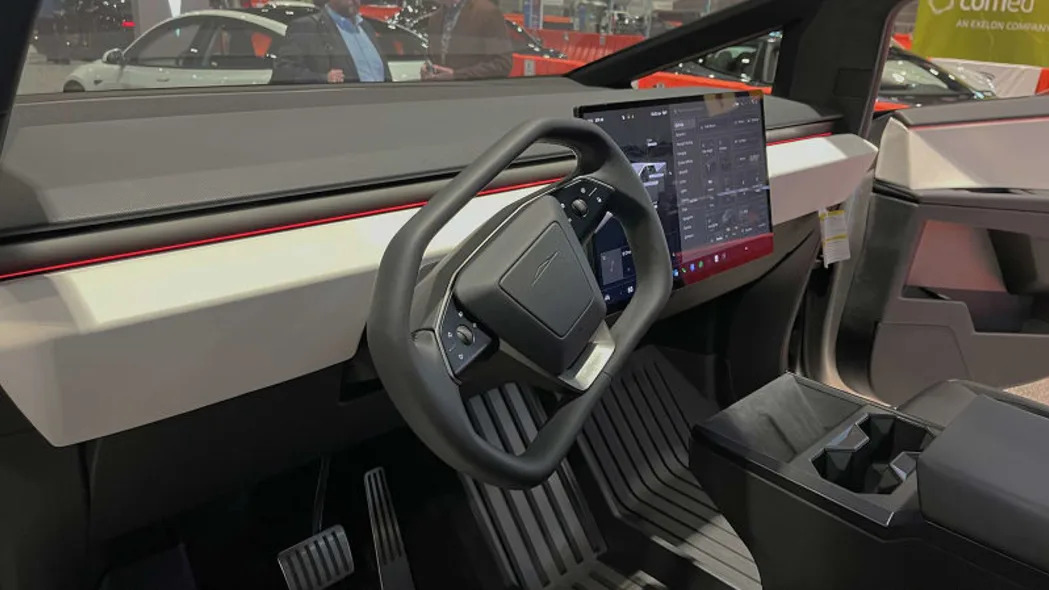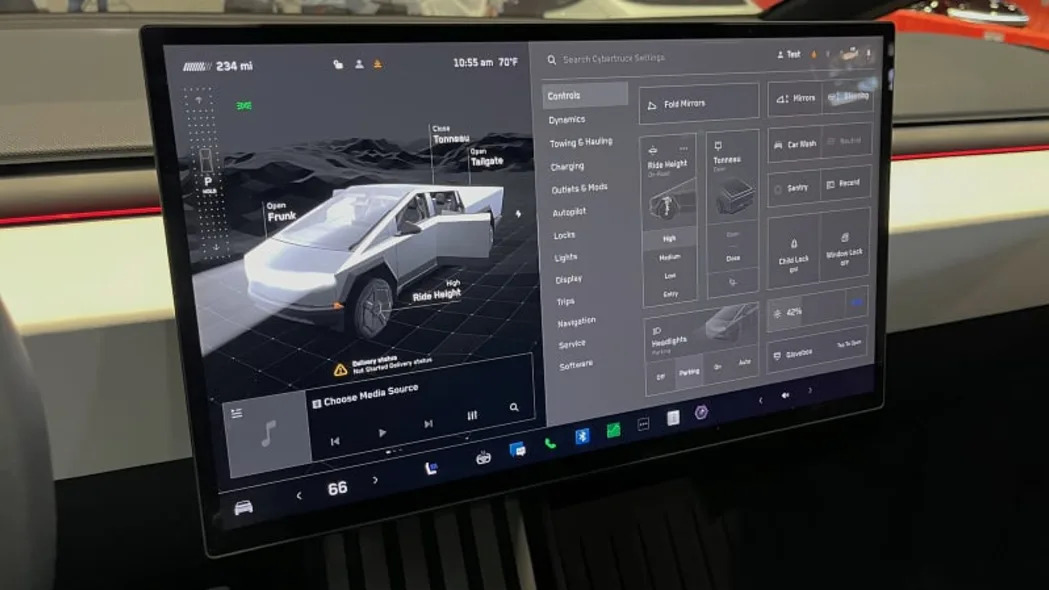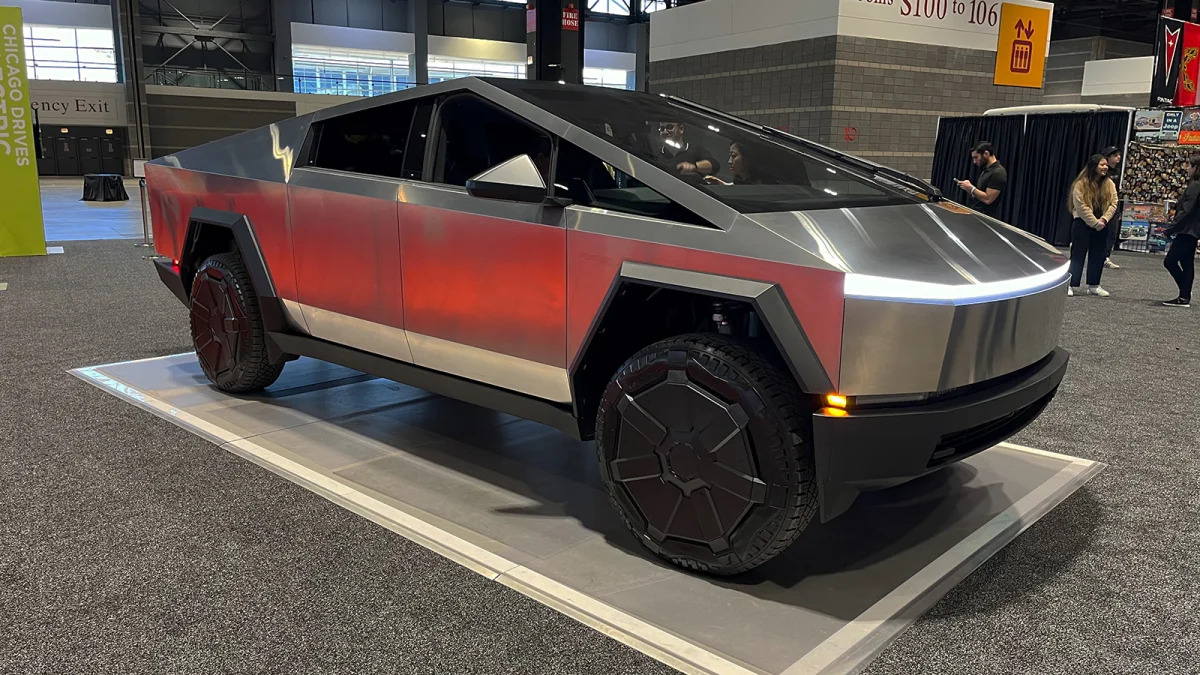Originally published on Bloomberg, written by Hannah Elliott
For the sake of this review, let’s suspend whatever we think of Elon Musk.
A truck this unusual deserves attention unencumbered by the distractions of its creator. The vehicle itself needs no introduction: Tesla has been collecting deposits since 2019 and started delivering the trucks in November. The company hasn’t said how many are out there, but we know that Serena Williams’ husband owns one, as does Pharrell Williams.
Contrary to the standard practice for most automakers, Tesla has not lent out the truck for mainstream press reviews. So I rented one from James Van Crofton, a real estate agent who listed his on Turo, the car-rental platform. Twenty-four hours and $1,391 later, I can report that Tesla’s paean to Brutalism surprised and delighted me in a drive around Los Angeles. While I kept the slab-sided Cybertruck in admittedly coddled conditions — I didn’t take it to a construction site or tow a boat — its nimble performance and thoughtful interior were a fascinating juxtaposition to its crude design.
Read More: Cybertruck first look: Interior and exterior review
The setup
James dropped off the $76,390 AWD version of the pickup on a Friday morning. I expected it to look futuristic in real life, considering its sci-fi-obsessed creator. But it actually looked nostalgic, reminding me of the stainless-steel wedge-shaped DeLorean featured in the 1985 film "Back to the Future" and the apocalyptic Spinners in Ridley Scott’s 1982 "Blade Runner." It looks a like a cross between a Tonka toy and an adolescent video gamer’s ultimate fantasy machine — not necessarily amateur, but a bit ridiculous.
I liked how the bands of lights at the front and rear matched the minimalistic design language of the body and, oddly, that the thing rolled on 20-inch wheels. So many expensive vehicles these days rock 22- and 23-inch variants, but the smaller wheels on the Cybertruck worked. Bigger wheels, if you choose them, could make it look even sillier than it already does; also, their extra size and weight will reduce driving range.
To open the door, you have to press an undetectable button hidden shoulder height on the B pillar (James had to show me where). Once inside, I encountered a serene environment. As in other Teslas, there are no knobs on the dashboard that spans the width of the cabin, punctuated only by a 18.5-inch control screen and the oblong but elegant steering wheel. First impression? Not bad. Sure, the cabin of anything from Mercedes-Benz, for instance, feels far more luxurious, and the Cybertruck lacks the Napa leather typically found in a vehicle at this price. But the interior’s clean, modern design goes a long way toward making it feel well done.
The console between the front seats doubles as storage and armrest, but since things like the climate and audio controls, as well as the shifter, are embedded in the computer screen, and the ceiling is a massive glass top, the cabin feels capacious. The glovebox glides out and offers enough space for a laptop; the two cupholders are the bare minimum for a truck. I wished there were a real button to push to engage the vehicle; using a screen without even the benefit of haptic feedback for shifting is neither the quickest nor the most intuitive way to get a vehicle to move. James pointed out that if I didn’t like screen-shifting, there are some selector icons located overhead near the rear-view mirror to shift, but he hadn’t figured out how to use them yet. I stabbed them a couple of times but got no result. Also, stabbing a finger overhead seemed more awkward than the alternative.
James handed over the black credit card-like key that Teslas use, which I placed in the front of the center console. That started the vehicle. Foot on the brake, sliding a cursor on the dashboard screen from N to D, and gently pressing the accelerator pedal: Liftoff! Such a big beast moving elegantly forward without a sound felt very cool.

The day
The plan was to use the Cybertruck for a stereotypical L.A. day: morning coffee, photo shoot, lunch in West Hollywood, afternoon chores and a Friday night double date.
I’d hardly left Hollywood before learning the first rule of Cybertruck: If you’re feeling shy, don’t drive it. You’ll be forced to discuss it with myriad strangers. The thing incites fervor to the point of recklessness. Multiple grown men on Hollywood Boulevard ran into traffic to take its picture.
The truck glided through downtown traffic in a buffer of silence that felt downright elitist. The steering felt light, and there was an unexpected smoothness to the regenerative braking. That steering wheel, shaped like an oval that has been squared off at the edges, felt ergonomic, like a natural extension of the rest of the truck. (It’s no accident that F1 cars also have rectangular steering wheels — the design works). The placement of the controls for indicators and things like the single wiper blade were not obvious. I had to hunt for them. It was annoying.
The Cybertruck is 70.5 inches tall and 223.7 inches long, with more than 17 inches of total ground clearance. People gawked. It was fun to see them measuring their own ride height against the towering Cybertruck. At nearly 6 feet tall when fully extended at its highest, it’s not quite as big as a UPS van, but it is as tall as as your average seven-passenger SUV. I scanned the horizon like Charlize Theron as Furiosa in "Mad Max: Fury Road." Stop me if I start talking about shaving my head….
I parked downtown near the Walt Disney Concert Hall, a Frank Gehry-designed metal mountain that felt tailor-made to match the truck’s angular stance. A construction worker abruptly jerked his pickup to the curb — no indicator of course, this is L.A. — and jumped out as I took photographs. His enthusiasm was endearing, if not his driving.

The pivot
I’ve driven other large vehicles powered by electricity, like the Hummer EV, Kia EV9, Rivian R1T and Rolls-Royce Spectre. I expected that the 6,603-pound, 600-horsepower truck would approximate their feel with powerful thrust, smooth acceleration and effective regenerative braking, and it did, towering over cars and surging forward like a spaceship with its gearless, instant-torque acceleration. It’s worth noting that the Cybertruck weighs far less than the 9,400-pound Hummer and about the same as the 6,855-pound electric Ford F-150 Lightning.
The air-ride suspension with 12 inches of lift (available at the tap of a screen icon) creates a feeling of complete separation from the road. Whipping through traffic or late-braking is not recommended. With an overall length of nearly 19 feet, tight corners and bends and curves in the road require careful attention. As for parking this thing: I left it on the street overnight, since it didn’t fit in my driveway. It's probably too large for some home garages.
But it differentiated itself from the others with tactile, nimble steering, and at low speeds, with sublime maneuverability. Where some big trucks feel cumbersome picking their way through parking lots, the Cybertruck gave no such stress. The real test was stopping for lunch, flipping the key card to a valet and basically telling him to figure it out (sorry, Ray!). Both man and truck handled a notoriously tight, awkward parking garage with aplomb. Credit Ray’s four decades of experience — and the Cybertruck’s rear-wheel steering. Both driving and parking visibility remain mostly unhampered even by the abrupt roofline and side pillars. The camera that doubles as a rearview mirror takes some getting used to, but it is effective.
After lunch, on a quick errand at Home Depot, swarms of iPhones clicked as I hunted for a parking spot. Is this what celebrities feel like? I’ll pass. Fifteen minutes later, I quickly loaded a planter and palm tree into the rear, and bounced. There were too many men longing to see inside.
Most of the attention was positive, but you’ll need thick skin if you own one, especially if you post photos of it online where the trolls are especially toxic. The Cybertruck makes as many people cringe as clap. “It looks like a midlife crisis,” a friend told me over lunch. “At least it looks interesting,” said another. “It’s not like all those other trucks.”
They’re both right.
I drove home later that night coddled in two-tone leather and the smug satisfaction of a do-gooder with more than 200 miles range still left on the battery. Tesla claims a range of 340 miles on a single charge; real-world driving will reduce that by 20% or more, by owner James' and my estimates. Plugging into a Supercharger will add up to 136 miles in 15 minutes, the company says. But results may vary. A standard household plug adds closer to about two miles per hour, says James.
The performance
On paper, the Cybertruck competes well with other electric pickups in its set. It boasts a 2,500-pound payload, 11,000-pound towing capacity, and more than 120 cubic feet of total cargo space. It has 685 pound-feet of torque — that’s more than a Ford F-150 Raptor. Top speed is 112 mph; the 0-60 mph sprint time is 4.1 seconds. (An upcoming, higher-performance variant called “Cyberbeast” will do it in 2.6 seconds, Musk promises.)
My paltry sundries didn’t come close to occupying the 6-foot by 4-foot truck bed, let alone the additional storage in the front trunk, on the roof and in the gear locker hidden underneath the bed. James said I was the first person to rent his Cybertruck and pointed out some minor marks in the composite bed he’d already acquired over minimal use; he also requested that I not drive it off-road. My sense is that with its light interior accents and propensity to show dirt and scratches, it will look rough relatively quickly over regular use, especially if you own dogs or use it for home improvement projects. My pooch, a 4-year-old German Shepherd named Willow, loved it. She jumped in the three-seat bench of a back seat and promptly fell asleep.
The quirks
I’ve read the reports of poor build quality, even premature corrosion. (Quick refresher: Stainless steel means “rust resistant,” not “never rusts.”) Build quality problems may exist, but I detected no uneven body panels here, even if some corners of the truck were so sharp they’d snagged a few fibers from what looked like a towel or washcloth that had been brushed over it. James mentioned the truck has already required some small repairs since he took delivery in late January (a loose screw in the door and a rear-view mirror that needed tightening). The Cybertruck’s long-term quality remains untested.
The rig does have its quirks. The automatic rolling, lockable cover for the bed comes standard, which is great for securing valuables, but when deployed, it totally blocks visibility in the rearview mirror. (The aforementioned rearview camera adequately compensates.) The overeager “Sentry” mode that keeps the car locked prevented quick access multiple times. I soon realized I had to use the key card to unlock the vehicle from the driver’s side; it wouldn’t open otherwise.
The headroom in the rear seat is compromised by the pitch of the roof, and the way the steel sides collect fingerprints and smudges is an obsessive-compulsive’s worst nightmare. Cleaning them off is like trying to remove dog hair from your coat. It’s a tedious task and there’s always one more that you missed. It quickly looks messy, degrading the look of the whole vehicle.
None of this did much to dent my fascination with the unexpected dichotomy of this raw-looking machine that felt so refined from behind the steering wheel. Saturday morning came too quickly. I awoke early, without an alarm, and walked outside. I had to get in one more coffee run before handing James back the key.










Sign in to post
Please sign in to leave a comment.
Continue